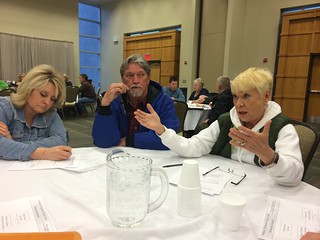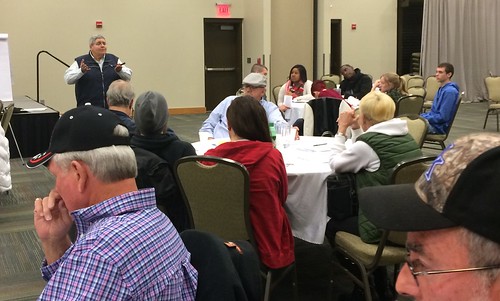Eastern Kentuckians work to guide Promise Zone process
“The idea of the Promise Zone is encouraging,” said Elizabeth Sanders, Letcher County Steering Committee Rep., back in January. “We have a vision for a future for eastern Kentucky and know we have a lot of promise here in the mountains. If the resources from the federal government through the Promise Zone will coordinate with things like the SOAR Initiative and other existing and future programs, we may begin to see some steps toward the change the people of eastern Kentucky have been ready for and working toward.”
Since KFTC’s Appalachia’s Bright Future Conference in Harlan nearly a year ago, some big announcements and initiatives have surfaced to build wider support for a just economic transition in eastern Kentucky.
Governor Steve Brashear and 5th District Congressman Hal Rogers worked together to launch the SOAR initiative with a well-attended summit last December, and in January we welcomed the declaration of eight eastern Kentucky counties as federal ‘Promise Zones’. Since then, KFTC members have worked hard throughout the 2014 Kentucky General Assembly to lift up our best opportunities for statewide legislation and stay connected to all these efforts to guide the economic future of eastern Kentucky.
Last week KFTC members of the Harlan and Letcher chapters turned out for listening sessions to guide the regional plan of the federal Promise Zones. On Tuesday evening in Harlan, local members represented nearly a third of the 70 or so people who turned out at the Harlan Center. In the same room that hosted large group discussions at Appalachia’s Bright Future conference, Harlan countians shared a vision of hope and possibility.
 Visions of parks, small businesses, trails and renewable energy made their way to large newsprint at the front of the room as a microphone was passed from table to table. Much of this spoken feedback was from young SKCTC students who traveled from the nearby community college campus with their entire evening class for the listening session.
Visions of parks, small businesses, trails and renewable energy made their way to large newsprint at the front of the room as a microphone was passed from table to table. Much of this spoken feedback was from young SKCTC students who traveled from the nearby community college campus with their entire evening class for the listening session.
Benham’s City Manager and longtime KFTC member Roy Silver shared the outline of an evolving "Benham Energy Project" collaboration between the city, Benham Power Board, COAP (Christian Outreach with Appalachian People) of Harlan, and KFTC.
“We’re trying to build support and capacity for a widespread energy efficiency program that has a history of success and can save all our residents and the city money. And the hope is that the money we save can be reinvested locally.”
The Benham Energy Project received a swell of applause, and others in the room also shared visions of renewable and energy efficiency solutions. When later asked about the greatest challenges ahead, Stanley Sturgill of Lynch stood and shared that, "Harlan County is currently split between four state House districts. We don't have one representative truly serving our county. Until we get some real representation in Frankfort, and DC for that matter, we're going to continue to have a hard time here."
One of the last comments of the night was about hope. A man shared that he believed a huge challenge was a loss of hope. He shared that if we are able to restore people’s hope, we’d be a lot better off. “We have to have hope.”
Two nights later in Whitesburg, a crowd that included more than a dozen local KFTC members and several elected officials gathered to provide similar feedback in Letcher County. First asked to build a list of Letcher County's current assets and resources, KFTC members in the room quickly filled up the list with contributions like creative people, a rich history of arts, culture and story telling, the ability to grow food and provide for one another, and institutions with a long history of community action, like Appalshop.
Herby Smith, who has worked to build Appalshop and KFTC for decades, stood to speak about the history in Letcher County of healthy “public discourse and community dialogue through the local paper, radio station, and similar community gatherings.”
 After a conversation about the many challenges and needs, those gathered were asked to imagine the region in 20 years and share out their vision. This came easy to KFTC members in the room who’ve been visioning, planning, and organizing for some time.
After a conversation about the many challenges and needs, those gathered were asked to imagine the region in 20 years and share out their vision. This came easy to KFTC members in the room who’ve been visioning, planning, and organizing for some time.
Dave Fisher, a farmer and small business owner, spoke about his vision for “revitalization downtown so we can draw visitors here, and a hotel or bed & breakfasts to keep them.”
“We need more youth employment opportunities so our young people can get experience, learn how to manage money, think about the work they want to do. We already have a great community college system. If we can connect our skilled people with high-speed broadband service, we could be a rural hub of technology for the whole country,” Ada Smith shared.
 The evening in Letcher County ended slightly different, and perhaps more promising, as all participants were welcomed to join the local planning team by simply adding their name to a list. More than 20 people volunteered themselves, so it seems Letcher County is in good position to begin a collaborative, community planning process that could add to and guide a regional plan.
The evening in Letcher County ended slightly different, and perhaps more promising, as all participants were welcomed to join the local planning team by simply adding their name to a list. More than 20 people volunteered themselves, so it seems Letcher County is in good position to begin a collaborative, community planning process that could add to and guide a regional plan.
According to Dr. Lori Garkovich, a University of Kentucky Extension Specialist who is facilitating this “listening” process in all eight Promise Zone counties, feedback will be compiled and submitted to inform a regional plan that must be completed by the end of May. Any federal proposals submitted from Promise Zone counties to fund projects connected to this regional plan will be given “preference points” and priority.
Counties are also able to created county-based plans. One exciting difference in this process noted by Dr. Garkovich is that listening sessions are also taking place in Promise Zone high schools to gather feedback directly from young people in the region.
Check kftc.org/eky for more on the analysis, action, and leadership of KFTC members as more is learned about the Promise Zone process, SOAR initiative, and growing efforts to guide the economic future of eastern Kentucky, in this year of the 50th anniversary of the War on Poverty.
Recent News
Kentucky’s past legislative session showed alarming trend toward government secrecy
Churchill Downs takes more than it gives. That's why the Kentucky Derby is a no-go for me
‘We must never forget.’ Kentucky town installs markers for lynching victims.
Featured Posts
Protecting the Earth
TJC Rolling Out The Vote Tour – a KFTC Reflection Essay
KFTC Voter Empowerment Contractor Reflection Essay
Archives
- Home
- |
- Sitemap
- |
- Get Involved
- |
- Privacy Policy
- |
- Press
- |
- About
- |
- Bill Tracker
- |
- Contact
- |
- Links
- |
- RSS

